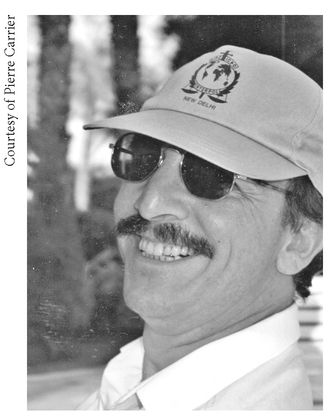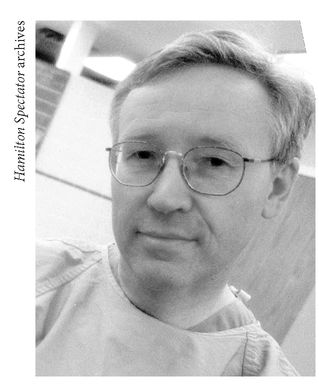Poison (30 page)
Authors: Jon Wells

“I’ll pass this on to the immigration office,” Carrier said. The woman had still held out hope of making it to Canada. Korol
had just ensured that it was highly unlikely to happen.
had just ensured that it was highly unlikely to happen.
Pierre Carrier

“One more thing Pierre,” Korol said. “I have to say I have…concerns…about how vigorous the local Indian police investigation will be of the deaths here with this Dulla guy around. I think he has a lot of influence with the witnesses and the police.”
Their business concluded, Carrier offered Korol and Dhinsa a chance to unwind.
India is beautiful, dirty, fantastic, frustrating. To a first-time visitor the impact on the body and mind is considerable. There is the heat, the Indian version of Montezuma’s revenge, and fear of contracting malaria. It starts weeks before arrival, the shots for hepatitis, boosters for polio and diphtheria, reimmunization against diseases long ago defeated in the West. Malaria pills, such as mefloquin, must be taken before and after the trip. The side-effects can be what are called “vivid dreams.” Perhaps it is not the pills at all, though, but India infiltrating the psyche that rouses the visitor from sleep in full sweat, a crack of moonlight between hotel curtains in the dark room, hallucinating and—whatever you do—do not allow that lone stray mosquito to bite, stay covered under the blankets no matter how hot it gets, wait for daylight.
“Perhaps you would like to cool off in the pool?”
By Indian standards the Canadian High Commission property was like a resort. There were volleyball courts, even a couple of nets for a version of road hockey. The grass was kept neatly trimmed with a power mower—a rarity in India. Lounging by a pool was something of a mixed blessing. It is, in fact, too hot to enjoy lying on the skillet that the patio becomes in the sun. Still, after long days in the stink and heat of Ludhiana and the villages, Korol could not believe how
good the tepid water felt when he lowered himself in. It was the Indian effect. For Westerners making their first trip, a whole new appreciation is felt for the simplest conveniences. The detectives savored their modest oasis, a hot wind whipping through the compound, while large black crows swooped in to sip at the water’s edge.
good the tepid water felt when he lowered himself in. It was the Indian effect. For Westerners making their first trip, a whole new appreciation is felt for the simplest conveniences. The detectives savored their modest oasis, a hot wind whipping through the compound, while large black crows swooped in to sip at the water’s edge.

Korol and Dhinsa landed in Toronto on May 14, 1997, with briefcases full of witness statements from India—and several bags of strychnine, in liquid and raw seed form. At customs neither detective declared he was a police officer. Korol wanted to see how easy it was to smuggle poison like strychnine.
“Anything else to declare?” the customs official asked the two men returning from a two-week stay in India.
“No,” said Korol.
“No,” said Dhinsa.
A week later, on Wednesday, May 21, Korol gingerly placed the strychnine samples into official plastic drug bags and filled out a request for the Centre of Forensic Sciences to test the material. The next day, Dhinsa and Korol drove to Toronto to deliver the samples. They met with Jim Cairns, Ontario’s new deputy chief coroner. Korol briefed Cairns on the investigation. The detectives needed more evidence, more scientific proof in the case.
“I’d like to get your opinion on exhuming the twin boys in India,” Korol said.
Cairns immediately thought of Dr. Charles Smith at the Hospital for Sick Children. Smith, Ontario’s best-known pediatric pathologist, was at that time considered Canada’s foremost hands-on expert in exhumations. Korol spoke with Joel Mayer, head of toxicology at CFS, and asked him to test the potency of the strychnine samples. Then he broached the question of the exhumation.
“Dr. Mayer, we’re pursuing a plan to exhume the twin boys in India and bring the tissue back here to CFS,” Korol said.
“If there is strychnine in the body,” Mayer said, “the liver, kidney, body contents, and the cloth that surrounds the bodies would show its presence.”
The next week, Korol decided it was time to let the media in on some of what was going on. Korol and police communications officer Ken Bond met to prepare a news release announcing that Parvesh Dhillon’s death was now being treated as a homicide and that detectives Dhinsa and Korol had been to India to investigate other fatalities as well. What the release did not say was that they still had no forensic evidence that Parvesh had been murdered.
Dr. Charles Smith


Warren Korol had been after Dhillon for nine months. Time to turn up the heat. Korol and Dhinsa knocked on the door at Dhillon’s home. Nobody home. They drove away, then saw Sarvjit Dhillon, his niece, on the sidewalk.
“Where is your uncle?” Dhinsa asked.
“Milton. His car broke down,” she said. “I can’t speak with you any more.”
She handed them a business card. Richard Startek. Attorney-at-Law. Korol smirked. That was the next stop. Korol and Dhinsa walked into the office on Queenston Road. Dhillon was there. He was not in Milton, and he did not have car trouble. Startek, a slight man with thick silver hair, was in an adjoining office. Startek was not on Korol’s list of favorite people. He had sent the letter in December suggesting that Dhillon’s rights to counsel had been violated by the detectives during the polygraph test.
“Mr. Startek,” Korol now said to the lawyer. “Let’s talk. All of us.”
The four men sat in Startek’s office. Korol nodded to Dhinsa. “Tell Dhillon that we think he murdered his business partner—and his wife.”
Dhinsa began speaking to Dhillon in Punjabi. Dhillon tried to interrupt. Startek motioned at Dhillon to listen.
“Your deceased wife,” Dhinsa continued, “Parvesh Kaur Dhillon, was poisoned and we have publicly committed her death as a homicide and you are the prime suspect. Do you understand?”
“
Mein kuch naheen keeta
,” Dhillon said. I didn’t do anything.
Mein kuch naheen keeta
,” Dhillon said. I didn’t do anything.
Startek held up his hand to Dhillon and said, in English, “You don’t have to say anything.”
“I know, I know,” Dhillon replied in English.
Korol shook his head. This is a joke, he thought to himself. Gee, Dhillon, aren’t we supposed to need a translator here?
“Dhillon,” Korol said, “could you leave the room now? We’d like to talk to your lawyer.”
Dhillon complied, then Korol turned to Startek, his eyes narrowing. “We are conducting an investigation here,” he said. “And I have to tell you I don’t appreciate you telling witnesses not to speak to us.”
“I told Sarvjit Dhillon,” Startek said, “that if she wished to talk to the police, she can do it in my presence. Sarvjit just left my office before Dhillon showed up. Dhillon’s family and the Khelas have an underlying fear of the police.”
Korol kept his tone even.
“Richard, we seek the truth. That’s it. We don’t tell people what to say. We only want the truth. And if we find out that people lied to us, we’ll tell them. And one more thing. It appears you have a conflict of issue here that you engaged in while instructing the victim’s family, the Khelas, and Sukhwinder Dhillon, who is our suspect, in relating police matters.”
Korol later recorded the exchange with Startek in his notes.
Two days later, a fax machine beeped in the office of an Ottawa law firm called Gowling, Strathy and Henderson. It was a statement of claim in a lawsuit. Gowling, Strathy and Henderson represented Metropolitan Life insurance. Dhillon knew how the system worked. He had rights. He remained the sole beneficiary of Ranjit’s life insurance, a tidy $200,000. So what if the police believed he had killed Ranjit? They had proved nothing. He was clear. No arrest. He was not about to let the money slip through
his fingers. Dhillon was suing for it—and then some. The date on the fax was May 30, 1997. The statement read:
his fingers. Dhillon was suing for it—and then some. The date on the fax was May 30, 1997. The statement read:
Sukhwinder Singh Dhillon vs. Metropolitan Life Insurance Company of Canada. Lawyer: Richard Startek. The plaintiff claims:
• Damages in the amount of $200,000 for non payment under a policy of life insurance.
• Pre-judgment and post-judgment interest.
• Costs of the action.
• Such further and other relief as this honorable court may permit.
• The plaintiff has duly requested that the death benefits be paid to him by the defendants. The plaintiff filed a claim under the contract of insurance on or about July 23, 1996. The plaintiff has not received any payment under the above policy of insurance. The defendants have refused and/or neglected to pay the plaintiff the aforesaid amounts, without just cause.
Warren Korol had asked insurance companies to watch for and report any claim on the life of Ranjit Khela. A lawyer at the Ottawa firm faxed a copy of the statement of claim to him. Korol picked up the fax and grinned. Dhillon. The son of a bitch was suing. Perfect. He would love to see Dhillon argue the claim in civil court.

On Wednesday, June 4, Korol and Dhinsa made the short drive from Central Station to the Crown attorney’s office in the old Hamilton court building on Main Street. They met with assistant Crown attorney Brent Bentham. Korol knew their window of opportunity was shrinking. Strychnine could leach out of the body completely in as little as two years. Dhillon’s boys had been dead 18 months. From Bentham’s office, Korol spoke on the phone with Jim Cairns.
Other books
Their Ex's Redrock Midnight (Texas Alpha) by Anders, Shirl
Somewhere in the House by Elizabeth Daly
Tin Swift by Devon Monk
Wolves at the Door by Veronica Blade
The Very Last Days of Mr Grey by Jack Worr
One for the Murphys by Lynda Mullaly Hunt
El misterio del Bellona Club by Dorothy L. Sayers
The Horse Tamer by Walter Farley
The Shining Ones by David Eddings